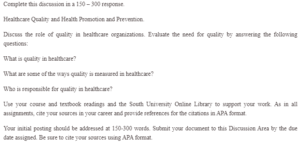Healthcare Quality and Health Promotion and Prevention
Quality in Healthcare
Our academic writing services are of high quality. We offer assignment help with high professionalism.
Healthcare quality can be defined as how healthcare services are delivered to increase the chances of patients’ outcomes. The services offered to the individuals or the public should be in tandem with the current skills and knowledge. There are six IOM quality domains: efficiency, safety, equity, timeliness, patient-centeredness, and effectiveness. For healthcare services to be effective, they should provide services supported by scientific evidence (Busse et al., 2019). From the clients’ perspectives, a quality healthcare service should keep them healthy, improve their health status, help them cope with a disability, and also help them cope with end-of-life situations. Currently, all healthcare settings, in collaboration with the government, aim to provide quality care to patients.
How Quality is Measured In Healthcare
The quality of healthcare should be measured to ensure effectiveness and efficiency. There are various ways of measuring the quality of healthcare service, including automated ways in which physicians and other healthcare providers are reminded of appropriate patient management methods. Second is measuring the risk associated with mortality to account for the severity of the patient’s diseases and the associated risk factors (Musa-Juros et al., 2018). The third is the measurement of medical errors that occur in an organization to pinpoint the errors and how they can be prevented—lastly, in patient feedback to compare the patients’ experiences with their expectations. In addition, the application of evidence-based practice in healthcare facilities can also be evaluated.
Responsible Teams for Quality in Healthcare
Quality of healthcare requires teamwork and good leadership. In an organizational setup, the individuals responsible for quality healthcare include organization administrative leaders, the health record team, the physicians, the nurse practitioners, and the nutritionists, among other healthcare professionals (Mannion & Davies, 2018). Nationally, the Ministry of Health and the political leaders determine healthcare quality, especially in government facilities, since they are the primary resource source.
References
Busse, R., Klazinga, N., Panteli, D., Quentin, W., & World Health Organization. (2019). Improving healthcare quality in Europe: characteristics, effectiveness, and implementation of different strategies. World Health Organization. Regional Office for Europe. https://apps.who.int/iris/handle/10665/327356
Mannion, R., & Davies, H. (2018). Understanding organizational culture for healthcare quality improvement. BMJ, 363. https://doi.org/10.1136/bmj.k4907
Musa-Juroš, K., Mijoč, J., Horvat, J., Ilakovac, V., Marković, S., & Racz, A. (2018). Measuring healthcare quality–the paradigm of MEDQUAL. Acta Clinica Croatica, 57(2.), 235-241. https://doi.org/10.20471/acc.2018.57.02.02
ORDER A PLAGIARISM-FREE PAPER HERE
We’ll write everything from scratch
Question

Healthcare Quality and Health Promotion and Prevention
Complete this discussion in a 150 – 300 response.
Healthcare Quality and Health Promotion and Prevention.
Discuss the role of quality in healthcare organizations. Evaluate the need for quality by answering the following questions:
What is quality in healthcare?
What are some of the ways quality is measured in healthcare?
Who is responsible for quality in healthcare?
Use your course and textbook readings and the South University Online Library to support your work. As in all assignments, cite your sources in your career and provide references for the citations in APA format.
Your initial posting should be addressed at 150-300 words. Submit your document to this Discussion Area by the due date assigned. Be sure to cite your sources using APA format.

